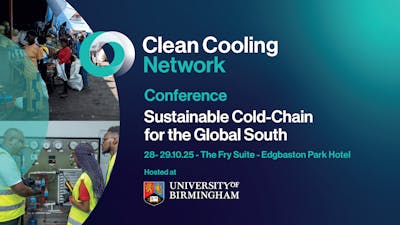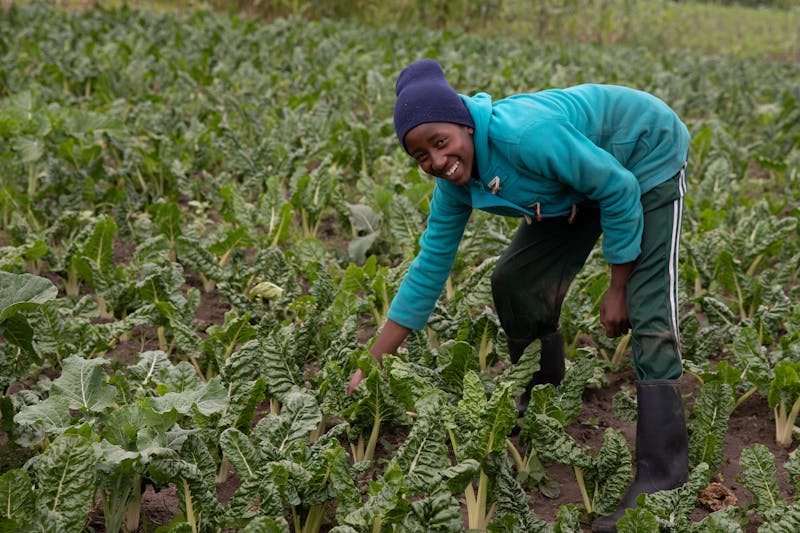Meet the presenters
We are proud to announce a list of presenters who are at the top of the cooling and cold-chain field of research and deployment
The conference is hosted at Birmingham University and will be overseen by Prof. Toby Peters and Dr. Leyla Sayin
Prof. Toby Peters
ACES Programme Lead and Director
Centre for Sustainable Cooling,
University of Birmingham
Toby’s research involves whole-system solutions to transition to sustainable cooling and cold-chain, and he is responsible for a series of flagship programs across the United Kingdom, Europe, and the Global South.
Toby is also a senior advisor on cooling and cold-chain for multiple international development organizations and a regular of author/co-author of key reports.
Dr. Leyla Sayin
Deputy Director, Centre for Sustainable Cooling.
Centre for Sustainable Cooling,
University of Birmingham
Research activities include developing methodologies and models for understanding and estimating current and future size and nature of cooling and cold-chain needs, the associated environmental impact, and unintended consequences; the assessment of social, economic, and environmental impacts of sustainable cooling and cold-chain provision to underpin investments; creating data gathering and audit frameworks for fit for market and purpose cooling and cold-chain solutions across technologies, services, policy, finance, and business models; identifying the policy, capacity building and financial interventions required to accelerate deployment of sustainable and resilient cooling and cold-chain solutions at scale equitably.
Dr. Tim Fox
Independent Consultant in Climate Change Mitigation and Adaptation; Lead author of The Hot Reality: Living in a +50˚C World report.
Clean Cooling Network
Dr Fox is a Chartered Engineer (CEng) and Fellow of the Institution of Mechanical Engineers (FIMechE), where he is Chair of the Biennial International Conference on Climate Change Adaptation and Resilience as well as a past Chair of the Process Industries Division. Tim represents the IMechE on the UK Infrastructure Operators Adaptation Forum and the Sustainable, Resilient Infrastructure Community Advisory Body of the Institution of Civil Engineers. He is also a member of the Adaptation to Climate Change Group of BSI Committee SES/001/07, a Co-Founder of the International Fugitive Emissions Abatement Association (IFEAA), and a Fellow of the Royal Society of Arts (FRSA).
Tim has been lead author of numerous peer-reviewed papers, research reports, thought leadership reports and policy papers and has been featured in hundreds of press articles, op-ed pieces, broadcast media appearances, conferences and webinars. In 2022, he was awarded the 'Most Distinguished Achievement Award' by the IMechE for his work on clean energy, climate change mitigation and adaptation, and sustainability. The award citation read: "Tim has made and continues to make an outstanding contribution to mechanical engineering at national and international levels in areas such as climate change, energy and environmental issues. His efforts have influenced policymakers at a high level and raised the profile of mechanical engineering thus capturing the attention and respect of the engineering community and wider public as a whole."
Conference chairs
We welcome the following speakers, who will chair our breakout rooms:
- Natalia Falagan - Reslient Communities
- Steve Cowperthwaite - Future Proofing
- Prof. Judith Evans - Training, Continuous Professional Development & Capacity Building
Dr. Natalia Falagan
Natalia has international experience in food production systems through collaboration with private companies and government funded research. She publishes her work in peer-reviewed journals focusing on postharvest biology, and sustainable technology and packaging. She is the course director of the Future Food Sustainability MSc programme and a STEM ambassador, bringing science and technology to schools.
She is a Member of the Royal Society of Biology, Member of the Institute of Agricultural Engineers, Fellow of the Higher Education Academy and Member of the Scientific Advisory Committees in the Food Standards Agency. Natalia sits on the Cold-Chain working group for the Cool Coalition and the National Technical Advisory committee for the African Centre of Excellence for Sustainable Cooling and Cold Chain. In 2021, Natalia has won the 'Top 50 Women in Engineering: Engineering Heroes' award in 2021 and a medal awarded by the Royal Academy of Engineering (Spain) in 2022 for her work towards food loss and waste reduction. In 2023, she was selected 'Best Research Supervisor' at Cranfield University in the Student Choice Awards.
steve Cowperthwaite
Prof. Judith Evans
London South Bank University
The current focus of her work is on efficiency and carbon/energy reduction as well as design and performance of refrigeration equipment. This covers cold chains in the UK and Europe but also in low-income countries such as Bangladesh, India, Kenya and Rwanda.
Judith has published 153 papers, 5 books and 17 book chapters. Professionally she is a Fellow of the IOR (Institute of Refrigeration), a member IOR national Technical Committee, president of the IIR (International Institute of Refrigeration) C2 commission (food science and engineering), vice presidents of the CaRe (careers in refrigeration) working party and the cold chain in warmer climates working party and a member of the D1 (retail display cabinets) committee. She is also the UK, IOR representative to the IIR and also an editor of the Journal of Refrigeration.
Conference presenters
Dr. Carol VERHEECKE VAESSEN
Supporting the food supply chain towards reducing food waste and loss
Carol is a Senior Lecturer in Applied Molecular Mycology at Cranfield University, UK, she is leading teaching and food-safety related activities within ACES to support advancing sustainable cold-chain technologies.
Carol has published 60+ research papers in peer-reviewed journal and lead activities towards transforming the food system by pushing the boundaries of food safety. Her research outputs support the implementation of new Decision Support Systems for post-harvest management.
Carol is a leader in new online teaching systems, applying her post-graduate certificate in academic practice (2021) to enhance the student experience towards learning while having fun!
Craig Girdlestone
Danston Ltd
Gideon Mulungi
London South Bank University
Driven by a passion for improving livelihoods and advancing sustainability, Gideon’s work is anchored in the belief that access to reliable and climate-friendly cold chain solutions is fundamental to food security, public health, and economic growth. His career reflects not only technical excellence but also a strong commitment to knowledge transfer and capacity building at different levels of the spectrum, ensuring that his work delivers real-world impact.
With extensive experience collaborating across continents, Gideon has engaged with a wide spectrum of stakeholders, from multilateral organisations and national governments to local communities in remote regions. His research and training initiatives span Africa, Asia, North America, and Europe, embodying a truly global perspective and reinforcing his dedication to shaping a more resilient and equitable future through sustainable development.
Dr. Athanase Dalson Gace
Academic Head
Africa Centre of Excellence for Sustainable Cooling and Cold Chain (ACES)
Gace is currently an Academic Head at the African Centre of Excellence in Sustainable Cooling and Cold-Chain (ACES), coordinating strategies and overseeing academic programs. He contributes significantly to ACES' mission of advancing sustainable cold chain technologies.
Gace has published several papers in prestigious journals and conferences and led as Principal Investigator transformative projects like the Solar-Powered E-tractor Development initiative. His research portfolio spans diverse areas, from applied metrology, refrigeration, cold chain, and solar energy systems, and their application for social and economic growth.
He is a reviewer for prestigious journals, including Flow Measurement Instrumentation, Measurement Science and Technology published by Elsevier, the Jordan Journal of Mechanical and Industrial Engineering, and the Journal of Advanced Thermal Science Research.
Jean Pierre Musabyimana
Research Lead
Africa Centre of Excellence for Sustainable Cooling and Cold Chain (ACES)
In this capacity, he actively contributes to conceiving and implementing innovative cold chain models for vaccines, diagnostics and antibody development that span sectors and geographies, applying renewable energy refrigeration, IoT-enabled temperature monitoring, and robust biobanking to safeguard biologicals and bolster supply chain integrity in low-resource settings.
An infection biologist with a PhD in Cell and Applied Infection Biology and dual MScs in Biotechnology & Bioinformatics and Global Health Delivery, Jean Pierre leverages his expertise in structural/comparative genomics, vaccine and therapeutic R&D, and advanced bioinformatics pipelines to align laboratory innovation with field needs.
He forges multisectoral partnerships with universities, industry, and government to pilot context-adapted interventions, drawing on One Health insights into urban agriculture, food systems, and resilience and addressing food safety risks through integrated approaches.
Regionally, he co-leads pandemic surveillance, genomics and climate modelling consortia, most notably the EDCTP3-funded GREAT LIFE initiative, which deploys field-portable genomics and novel diagnostics across the African Great Lakes, advancing early detection and response. As Co-PI of the KIVU JUA consortium, he spearheads Mpox epidemiology and immunology research in Central Africa, contributing to the WHO Mpox Genomic Surveillance Community of Practice and serving on Africa CDC’s RISLNET committee. He also co-leads malaria drug resistance surveillance in East Africa, integrating NGS workflows into routine monitoring for artemisinin resistance.
Passionate about sustainable cooling, Jean Pierre weaves environmental engineering, data analytics, and One Health principles to reinforce vaccine delivery, food safety, and overall health system resilience, positioning ACES and Rwanda as models for cross-sectoral, climate-smart public health preparedness.
Prof. Ian Thomson
Professor of Accounting and Sustainability
University of Dundee
Ian has been researching topics relating to responsibility, sustainability and accountability for over 30 years. This research has included studies on the implementation of cleaner technology, effective stakeholder engagement, risk governance in water and salmon farming, sustainable development indicators, government policy making, climate change, effective pedagogy, use of accounting by activists, human rights, international development programmes, and football clubs.
Dr. Christopher Green
Associate Clinical Professor & Consultant Physician in Infectious Diseases
Christopher Green is an Associate Clinical Professor and Consultant Physician in Infectious Diseases. As well as a clinician, his main research interest is the development of new experimental vaccines for infectious diseases and in optimising vaccine impact for Africa.
His DPhil at the University of Oxford was in leading the first-in-world clinical trials of viral-vectored vaccines for respiratory syncytial virus (RSV), which was directly relevant to COVID-19 vaccines needed to safely end the pandemic. He led many vaccine trials and other high-priority projects in this time and was a member of SAGE on hospital disease epidemiology. Today, his team works on first-in-human trials of experimental vaccines for infectious diseases and is one of only a few global sites undertaking human challenge studies (deliberate infection) as part of an accelerated evaluation of vaccines. However, vaccine innovation needs to have impact in resource limited areas of the world. His global health research is based in Rwanda and this work includes designing ‘next-generation’ vaccine deployment systems needed for equitable access to mRNA vaccines and resilience to climate change, developing novel immune diagnostics for vaccine prioritisation, clinical vaccine trials and developing new bioinformatic ‘over the horizon’ public health threats detection systems.
Google scholar link:
https://scholar.google.com/citations?user=XcLmlCkAAAAJ&hl=en

